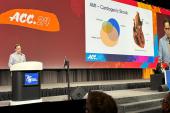Everyone’s Glum About RECOVER IV: Where Shock Care Heads Next Is Unclear
With mixed feelings, experts in the field mourn what’s lost but remain optimistic that new, perhaps better, trials lie ahead.

When the news broke of an early end to RECOVER IV, many in the cardiology world reacted with a mixture of disappointment and grim acceptance. But, for several physicians who spoke with TCTMD, those mixed feelings also came with a dose of optimism that the field will continue to move forward in unexpected ways.
Positive data from the long-awaited DanGer Shock trial, released 2 months ago, showed an absolute mortality reduction of 13% with Impella CP (Abiomed) mechanical circulatory support (MCS) in patients with STEMI complicated by cardiogenic shock compared with standard care, albeit with an increase in complications. Many people wondered what would come next.
RECOVER IV’s demise is the first such fallout: it came to a halt last week after the trial’s data and safety monitoring board (DSMB) expressed concerns about equipoise.
DanGer Shock’s principal investigator, Jacob Eifer Møller, MD, PhD, DMSc (Copenhagen University Hospital Rigshospitalet, Denmark), told TCTMD that he also has “very mixed” feelings about the decision to end RECOVER IV.
“I think, as a scientist, we need more data, and I completely agree with the voices that are out there stating that we really should have more data and the fragility of DanGer Shock is very real,” Møller said. Also, the European trial was conducted in a “closed environment” by a few expert centers, he noted. “It’s hard to say what would happen if you brought it out to a large number of centers and sites.”
On the other hand, the issue is “really complex and I think from the patient’s perspective, this is really difficult, because these patients are so sick that in the vast majority you will not be able to get formal consent” for randomization.
“When we did DanGer, we believed that we were doing some good with the device, so it was easier to say, ‘We’re doing this because we want to improve treatment.’”
Now, with the DanGer Shock results available, it’s more likely that patients—were they able to express their wishes—would have a preference about whether to join a randomized trial, Møller explained, so institutional review boards at Danish and German sites have been expressing concern about whether to participate in RECOVER IV.
I think the field is actually going to explode now with people wanting to improve on the results of DanGer, and I think that's how the field will be advanced. William O’Neill
Srihari Naidu, MD (Westchester Medical Center, Valhalla, NY), the vice president of the Society for Cardiovascular Angiography and Interventions (SCAI) who led the group’s effort to develop the first-ever classification system for cardiogenic shock, told TCTMD he understands the decision to stop RECOVER IV.
“If a DSMB looks at it objectively and decides that, either for futility or for safety reasons, the trial should be stopped, then that is a very reasonable reason to do it,” he said, given that the whole purpose of a DSMB is to be a third party watching over any feasibility and safety concerns in a study.
Still, without RECOVER IV, there’s no way to confirm—or refute—the mortality reduction seen in DanGer Shock, which was more than a decade in the making.
“One of the challenges,” said Naidu, “is that the community tends not to believe just one trial, and every trial has limitations.” DanGer Shock, though “fabulous,” left several questions unanswered that might have been clarified by another trial, he added. “Number one, why is the mortality still so high? Number two, why are the complication rates still so high? And number three, what's going on between 30 days and 6 months that we need to look at?”
William O'Neill, MD (Henry Ford Health System, Detroit, MI), a principal investigator (PI) for RECOVER IV, said he and the other investigators didn’t take the decision to halt lightly.
“There was a lot of angst and a lot of consternation, but at the end of the day, the operators—the doctors on the ground that were actually going to be treating patients and looking at them eyeball to eyeball—are the ones that were expressing an enormous amount of hesitation,” O’Neill said last week in an interview after the dust settled. With an open-label trial like RECOVER IV, “it's very, very difficult in these high-risk, deathly ill patients to do something that you think might not be the right way to go,” he added.
When the enrollment is very slow, then it's not ethical, of course, to enroll patients because they are randomized for no reason. Davide Capodanno
Navin Kapur, MD (Tufts Medical Center, Boston, MA), also a PI for RECOVER IV, observed that “doing these trials is very difficult,” something the lengthy journey of DanGer Shock made clear. The trial was quite selective in enrolling only STEMI patients and excluding those with out-of-hospital cardiac arrest who remained comatose after arrival to the cath lab and those with overt RV failure, but then it faced slow enrollment.
In contrast, the negative IABP-SHOCK II and ECLS-SHOCK trials of intra-aortic balloon pump (IABP) and extracorporeal membrane oxygenation (ECMO), respectively, had broader inclusion criteria and moved at a faster pace—but at a cost, he pointed out. “If you test routine use of a technology amongst all comers, then you can enroll very quickly but you may not ever really move the dial because the P value is nonsignificant between the treatment arms because you're just including too broad a population.”
RECOVER IV trialists aimed for inclusion/exclusion criteria that landed in the middle of those two approaches, Kapur said. After putting in years of effort, he added, “no one's more disappointed than us.”
Holger Thiele, MD (Heart Center Leipzig at University of Leipzig, Germany), who led IABP-SHOCK II and ECLS-SHOCK, said the decision to end RECOVER IV wasn’t valid. “I understand that there is one positive trial with DanGer Shock, but DanGer Shock still raises multiple questions,” he wrote via email. These include the 11.9% increase in mortality in controls between 30 days and 6 months, the high need for renal replacement therapy in the Impella arm, as well as “a lack of pathophysiological explanation,” Thiele specified. “We’re still missing data on cardiac power output, lactate clearance, left ventricular ejection fraction, catecholamine use and doses, etc.”
Without RECOVER IV, there will neither be a confirmation nor rebuttal of DanGer Shock “in a broader and larger patient population,” he said.
Naidu, for his part, noted that the US-led RECOVER IV trial was an opportunity, now lost, to find out more about how Impella stacks up against IABP. In Europe, guidelines that once gave IABPs a class I recommendation for cardiogenic shock downgraded that guidance to class III after the randomized IABP-SHOCK II trial failed to find a 1-year survival benefit in comparison to optimal medical therapy. In the United States, Naidu pointed out, the use of IABPs hasn’t seen a similar decline: many US centers still don't have access to Impella and some operators believe that IABPs, by virtue of having smaller catheters, involve fewer complications.
Across the world, care is delivered differently in different regions, he noted, which is all the more reason to have multiple trials that capture those variations.
Making sure to involve not only centers that already had high Impella use but also those that rely more on IABP would be informative, Naidu said. “I do think a second trial with the inclusion of balloon pumps is one of the areas that the community here on this side of the Atlantic was looking for.”
Kapur, however, explained that all centers participating in RECOVER IV had to be experienced in Impella. “The sites that could effectively participate were the ones who not only saw enough heart attack patients with cardiogenic shock, but then also had . . . to have access to the entire Impella family of technologies, the access to balloon pump, the access to VA ECMO without having to transfer the patient to another facility.”
The community tends not to believe just one trial, and every trial has limitations. Srihari Naidu
Davide Capodanno, MD, PhD (University of Catania, Italy), editor in chief of EuroIntervention, said that he, too, was disappointed. “Every time a trial is stopped, it's not good news,” he told TCTMD. There’s still room for “reassurance that this device works. And of course we have one trial [already] but you need replication of results,” especially because the P value for DanGer Shock’s primary endpoint was 0.04.
DanGer Shock, while a positive trial, is “not really the solid piece of evidence that we would like to see to be fully convinced,” especially after the negative trials of ECMO and IABP, Capodanno commented. When looking at the overall category of MCS devices, “the evidence is mixed.”
Apart from the question of equipoise, Capodanno highlighted another ethical concern: what should happen once there’s doubt over whether a trial will ever be completed? Recruiting patients in RECOVER IV was proving to be a slow process, he noted, and “when the enrollment is very slow, then it's not ethical, of course, to enroll patients because they are randomized for no reason,” he said, adding that trial participants need to know their efforts aren’t irrelevant—as they might be if a trial never reaches its enrollment goals—but a way to help other patients.
What Next?
Naidu predicted that studies investigating strategy, not one therapy versus another, will pick up steam. “The field is moving more towards understanding the shock state more comprehensively and doing more of a protocol or an algorithmic approach to care,” he explained. So Impella versus no Impella might be an initial strategy, with the freedom to follow that with other options as the operator sees fit, much like trials of immediate versus deferred PCI, said Naidu.
Others suggested additional possibilities, such as studies exploring populations who’d been excluded from DanGer (eg, NSTEMI), the use of strict protocols to avoid complications, and the potential impact of newer devices with smaller profiles. The ULYSS randomized trial, based in France, is ongoing.
There’s the reality that an industry-sponsored trial, no matter how rigorous, may not “really answer the [pragmatic] questions that the community wants answered” about the many treatment possibilities, said Kapur. To that end, “there needs to be a [National Institutes of Health]-driven initiative to support randomized trials in the space of cardiogenic shock,” he suggested. “Take it out of the hands of industry and put it in the hands of investigators and academic parties. . . . It's not like a stent trial. It's not like a TAVR trial. These are extremely critically ill patients, dynamic, fluid situations, and the ability to test all technologies in one trial is really challenging.”
Right now, researchers are still “learning a lot about how to design the next trial,” Kapur added. “But there will be more trials, I have no doubt. It’s just a question of who’s going to fund it.” He cited the Europe-based ALTSHOCK trial of IABP for cardiogenic shock in acute decompensated chronic heart failure as one to keep an eye on, as well as the topic of ECMO’s role in addressing shock.
Møller said that while observational data will continue to arrive, ultimately collaboration among the various research groups around the world is needed. “It's very difficult to do these studies without joining forces,” he stressed.
O’Neill said that he’s optimistic about the future. “I'm actually very encouraged about all of this [discussion], because I think the field is actually going to explode now with people wanting to improve on the results of DanGer and I think that's how the field will be advanced,” he predicted. “What are the problems with the device? What are the complications? Can you make it better? And if you can improve [those] outcomes, you can improve survival.”
Gregg Stone, MD (Icahn School of Medicine at Mount Sinai, New York, NY), study chair for RECOVER IV, said on X that their work is far from finished.
2/2 We are actively exploring other randomized investigations of Impella in AMI-cardiogenic shock. Possibilities include examining best practices to reduce complications, selected multivessel intervention, early escalation to Impella 5.5, Impella in chronic HF-shock, and more.
— Gregg W. Stone MD (@GreggWStone) June 18, 2024
Caitlin E. Cox is Executive Editor of TCTMD and Associate Director, Editorial Content at the Cardiovascular Research Foundation. She produces the…
Read Full Bio




Comments